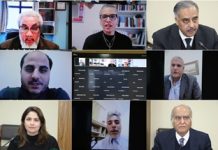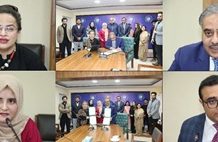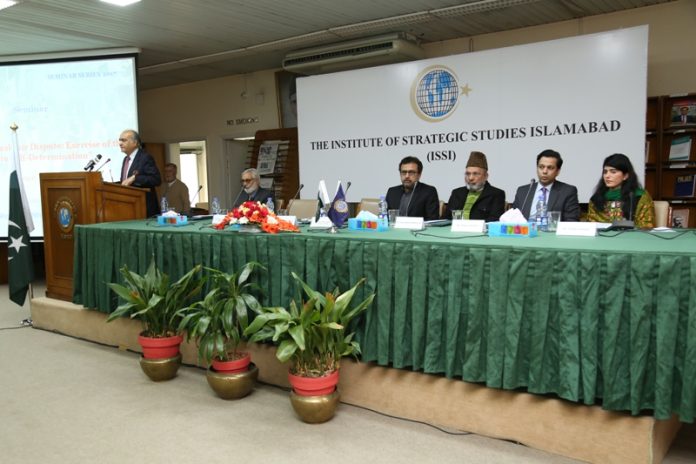Press Release
Seminar on “Solving the Kashmir Dispute: Exercise of the Right to Self-Determination”
Institute of Strategic Studies Islamabad
February 2, 2017
The validity of the UN resolutions on Kashmir does not lapse with time rather it has been affirmed by consequent Secretary Generals of UN on several occasions. Pakistan’s commitment and fidelity to the cause of Kashmir remain as firm as ever while the bigger powers remain embroiled in their geopolitical and strategic interests. This was stated by Chairman Institute of Strategic Studies Islamabad at a Seminar on “Solving the Kashmir Dispute: Exercise of the Right to Self-Determination” organized by the Institute today.
The Chief Guest on the occasion was, H.E. Sardar Awais Ahmed Khan Leghari, Chairperson of the Standing Committee of National Assembly on Foreign Affairs. Other dignitaries of the seminar included, Mr. Ghulam Muhammad Safi, Convener APHC; Ms. Mushaal Hussein Mullick, human rights activist; Mr. Mohammad Farooq Rehmani, senior leader APHC; and Mr. Ahmed Quraishi, CEO Youth Forum for Kashmir.
Ambassador Khalid Mahmood, Chairman Board of Governors of ISSI, in his welcome remarks greeted the Honourable Chief Guest, Sardar Awais Ahmed Khan Leghari, distinguished panellists and the auspicious audience. He began by reiterating that the international community in general and the people of Pakistan in particular are well aware of the genesis of Kashmir dispute. It was unambiguously decided in all United Nations resolutions that the future of the Kashmiri people will be decided by an impartial plebiscite under the auspices of the UN, which was accepted by India, Pakistan and the International community. In violation of these resolutions, Indian repression continues to this date with 700,000 military and paramilitary forces being deployed in the region and countless atrocities being carried out against the innocent civilians in Kashmir. The Chairman stressed that the role played by the youth of the Indian-held Kashmir (IHK) in their legitimate struggle for their right to self-determination is certainly commendable. The issue of Jammu & Kashmir is not a territorial dispute between Pakistan and India but a movement for the right to self-determination which is enshrined in the human rights’ charter of the UN. He concluded on the words of Martin Luther King, “The ultimate tragedy is not repression by bad people but the silence over it by the good people.”
Mr. Ghulam Muhammad Safi stated that the issue of Jammu & Kashmir has remained unresolved since the past seven decades. The road map given by UN in 1948 and 1949 for the resolution of this issue comprised of a ceasefire, synchronised withdrawal of troops and an impartial plebiscite to decide the fate of the Kashmiri people which has not been implemented due to the obduracy of the Indian government. He went on to say that Kashmiris as basic party to the dispute have every right to decide their own fate. He stressed that the elections held by India in the IHK are not contiguous with the text of the UN resolutions that demands a neutral and objective plebiscite. In the end, he emphasized that the people of Kashmir, as well as their leaders such as Syed Ali Gillani, Mirwaiz Umer Farooq, Yaseen Malik and Aasia Andrabi have all remained staunch on one narrative, i.e. the right to self-determination for the people of Kashmir.
Ms. Mushaal Hussein Mullick in her speech stated that the people of Jammu & Kashmir who are larger in number than 123 currently independent nations, having a defined historical identity are since decades engaged in a massive, indigenous and non-violent struggle to win their freedom from the foreign occupation if their land. Kashmir has been plagued by the denial of the right to self-determination. She emphasized that no better contribution can be made to the world than to work for peace and freedom and what better way than to start with Kashmir.
Mr. Mohammad Farooq Rehmani stated that the rise of ‘Hindutva’ in the shape of Modi is a great threat to peaceful co-existence and the right to self-determination of the Kashmiri people. We want only freedom and the right of self-determination according to the UNSC resolutions, accepted both by India and Pakistan. He appealed to Pakistan to draw a result-oriented strategy for the resolution of the issue of Jammu & Kashmir.
Mr. Ahmed Quraishi saluted the brave youth of Kashmir upon defeating the world’s second largest army by merely standing up to it, peacefully. He went on to say Kashmir is the first line of defence of Pakistan against India’s hegemony. Owing to the relentless and just struggle of the Kashmiri people, their cause has finally gained the recognition that it deserves on the international level.
Ms. Tooba Khurshid highlighted in her presentation that from the legal standpoint, the right to self-determination is the right of indigenous people who have deep-rooted cultural links to their land. Kashmir has all these elements such as a territory that is home to more than 13.65 million people and a long history of independence and self-governance. The systematic human rights violations being committed by India in Kashmir need no evidence for they have been projected far and wide by the power of electronic, print and social media. She concluded by saying that, “India needs to realize that chains are made to be broken and Kashmir shall be liberated one day.”
The Chief Guest on the occasion, H.E Sardar Awais Ahmed Khan Leghari stated that there were three stakeholders in the Kashmir Dispute namely the Kashmiris, Pakistanis and Indians. He highlighted what he termed as the hypocrisy of the international community and noted the international community’s harsh reaction to President Trump’s executive ban order. He questioned why the global community did not take note of the atrocities happening in Kashmir and stated that such an aggressive reaction should also be shown towards this issue. He pointed out that such contradictions have emerged out of democracies who boast of having such high morals and values and stated that Pakistan’s stance is clear on the dispute issue. He went on to say that Pakistan has been responsibly fighting terrorism- something that benefits the entire international community. In this time of social media such atrocities cannot be concealed. Now that the youth of Indian held Kashmir have picked up on the issue, it will not be dismissed any time soon. Hence, the sooner the dialogue process starts the better for peace and stability of the entire region.
Ambassador Khalid Mahmood, Chairman Board of Governors of ISSI stated in his concluding remarks that Kashmir belongs to the Kashmiris. It is in the best interests of both Pakistan and India to resolve this issue, if not through bilateralism then other methods mentioned in the UN charter such as arbitration, mediation and judicial decisions.












